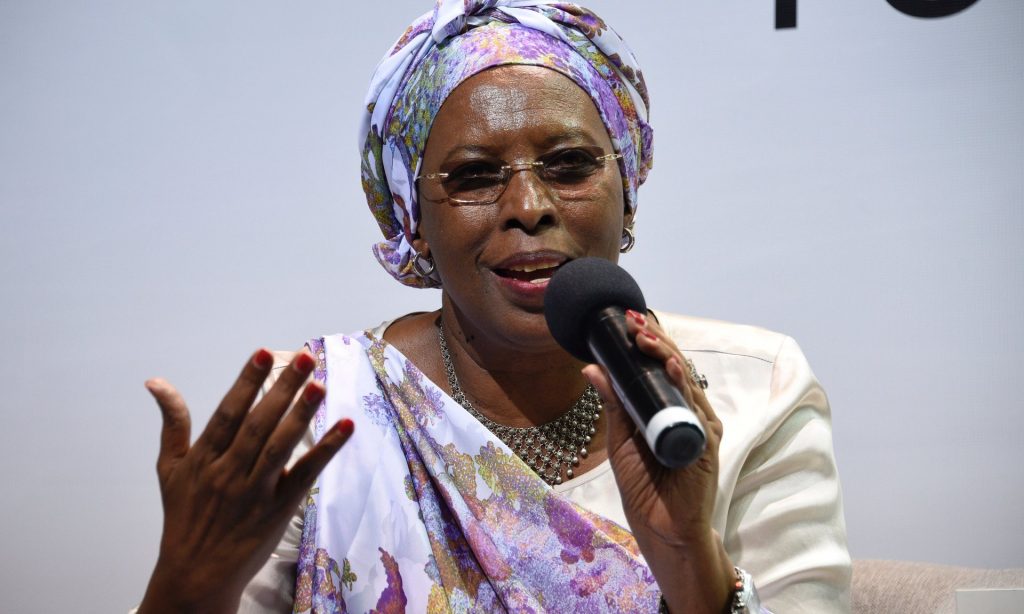In October 1993, two days after her Tutsi family were murdered by Hutus in Burundi, Marguerite Barankitse stood in front of a house of Hutus to stop a mob of local Tutsis taking revenge. “Before I am a Tutsi, I am a Christian,” Barankitse remembers telling the mob. “I will not allow you to kill those people.”
The mob took no notice. Calling Barankitse a traitor, they stripped her, tied her to a chair, and burned down the house. “The Hutus were obliged to come out,” she says. “And to punish me, the Tutsis killed 72 people.”
In the aftermath, Barankitse saved 25 orphaned children, hiding them in a German aid worker’s house – and later set up a school specifically for their education. Twenty-three years later, that school – now known as Maison Shalom – has cared for 30,000 children, all of them taught to think beyond ethnic divisions. “It’s not just about helping orphans,” Barankitse says. “It’s about transforming the society of Burundi in a profound way, a holistic way – a mission to break this cycle of violence.”
Yet just two decades since her intervention, that violence has returned once again to Burundi, forcing Barankitse to flee for her life, along with a quarter of a million Burundians.
Barankitse fares better than most: she recently won the $1m Aurora prize for her humanitarian work, which she is ploughing back into Maison Shalom. However, as in 1993, when the international community initially ignored the sectarian violence in Burundi and neighbouring Rwanda, she says the world has once again forgotten the plight of her country.
We meet during a quiet moment at May’s world humanitarian summit in Istanbul, and even Barankitse’s usually warm and booming voice becomes subdued when she thinks of the indifference of the politicians around her.
“At this summit, nobody is mentioning Burundi,” says Barankitse, speaking in a blend of French and English. “Syrian refugees are a problem for European countries – but Burundians are not a problem immediately. Burundi is far from Europe. But what is ‘far’? It’s a ridiculous word. We are never far. We are from the same humanity.”
The violence in Burundi is the fallout from President Pierre Nkurunziza’s decision to run for a third term in office, which sparked protests that in turn prompted Nkurunziza to mount a crackdown on all forms of opposition. It is nevertheless nearly as brutal as the violence Barankitse witnessed up close in 1993, and she hands over a smartphone with films of obscene torture.
“In 1993 it was an ethnic conflict, the Hutus tried to kill Tutsis,” says Barankitse. “Now it’s political. It’s the police and the government, who are supposed to protect their population but who are killing them.”
Barankitse became a target for the regime, and last year her former students encouraged her to leave while she still could. “It’s better for you to save many Burundians outside the country than to be inside and be killed,” she was told.
She laughs as she remembers evading detection at the airport by swapping her traditional dress and headdress for the sunglasses and smart trousers of a businesswoman. Less amusingly, in her absence the government shut down Maison Shalom – resulting in former students taking in the current ones – and seized its funds.
For now, it’s the end of an institution that tried to promote cultural change in Burundi by encouraging its students to think of themselves as citizens first, rather than as Hutus or Tutsis. It is a mantra that Barankitse fought for, even before she founded the school; as a young woman, she adopted three Hutu children and four Tutsis, and brought them up as one family.
“I dreamed of creating a new generation, to raise Hutu and Tutsi together, to show that it’s possible to live together,” she says. “That it’s a political problem, not an ethnic problem.”
Now exiled in Rwanda, Barankitse tries to promote her vision through other means. She can’t set up another school for the moment, but instead Maison Shalom helps to pay for education among the Burundian diaspora, and offers micro-credit to refugee women in Rwanda.
Winning the Aurora prize – a prestigious humanitarian prize founded in memory of the Armenian genocide – was an honour that she says was celebrated enthusiastically throughout the Burundian diaspora. “You should have seen how they danced in the refugee camp – all the children were dancing all night!” Barankitse remembers. “I was crying all night – because all the Burundians said: ‘Wow! Now we’ve washed away the shame.’”
Every day, more than 100 Burundians still cross the borders into neighbouring countries in search of safety. But despite their plight, Barankitse believes that her country will eventually win out – and that her former students will lead Burundi’s rehabilitation.
“It’s always love that takes the last word,” she says. “I have suffered so much. But I know even now that we will return, and we will celebrate the victory of love over hatred. Among those 30,000 who passed through Maison Shalom, there are those who will always stand up and never give up, who are little candles among the darkness. Our mission is to put a little candle among the darkness. It’s always the light that chases the shadows, not the shadows that chase the light.”

